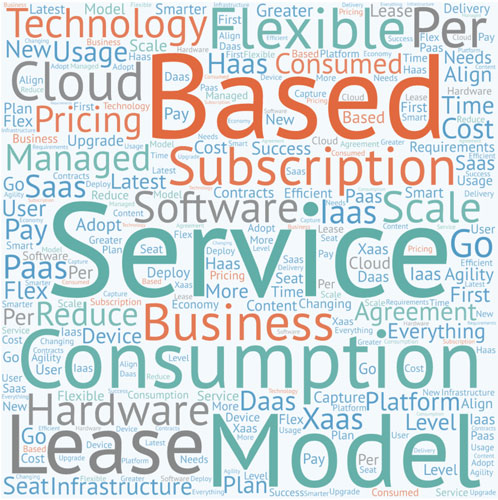This article originally appeared on https://www.alarisworld.com/en-in
Consumption based business models extend into document capture solutions.
While the subscription economy is well established in IT solutions, Information Management solutions have not traditionally been widely available to purchase “as a service.” Driven by rapidly changing market requirements, the way Information Management products and services are consumed is now undergoing a seismic shift.
Flexible consumption models
Driven by business demand, flexible consumption models that enable organizations to acquire new IT hardware and software, cloud-based services, capabilities and applications, based on need and usage, are fast replacing traditional pay upfront and perpetual licencing pricing models.
Analysts recognize the importance of cloud computing and flexible consumption models to organizations’ competitiveness. Deloitte highlights in its 2019 Technology Industry Outlook that these capabilities will likely become even more indispensable as companies strive to transform their business models and operations.
Cloud computing – a truly disruptive force in IT – has resulted in a mix of software-as-a-service (SaaS), platform-as-a-service (PaaS), and infrastructure-as-a-service (IaaS) consumption-based business models and subscription-based pricing plans, in which buyers commit to a service aligned with their needs for a specified period of time.
Software vendors have taken the lead in this area. As evidenced by the widespread adoption of SaaS, the debate about whether the software industry will move from a traditional license and maintenance model to a subscription-based model is long over.
While the Information Management and in particular Document Capture industry was late to adopt consumption-based business models, these are now available from all leading software vendors.
Everything-as-a-service
CIO.com reports that everything-as-a-service (XaaS), in which any IT function can be transformed into a service for enterprise consumption, is emerging as a go-to operating model for delivering IT services. The results of Deloitte’s Flexible Consumption/XaaS Survey validate that XaaS can help companies get nimbler. ‘Accelerated innovation’ overtook ‘reduced costs’ as a key priority for XaaS initiatives for companies in which more than three-quarters of the enterprise IT is XaaS and in organizations that have been using flexible consumption for more than three years. Access to newest technology was cited as the No. 3 XaaS objective by survey respondents.
The concept of not having to physically own technology is also gaining traction within the hardware sector. HaaS (hardware-as-a-service) and DaaS (device-as-a-service) – subscription models in which leased devices are owned, managed and supported by a third-party as defined by a service level agreement, are gradually becoming more commonplace. A Spiceworks study found that half of businesses leasing hardware subscribe to the HaaS model for at least one type of device. And over the next two years, an additional six percent of organizations leasing hardware plan to adopt the HaaS model.
In the scanner market leasing and rental have been the exception in the past. With the overall spread of the consumption economy into the Information Management market, the demand for HaaS and DaaS based scanner offers continues to increase.
Greater flexibility for the business and IT
Consumption based business models allow business management to flexibly align the solutions and services they consume with their requirements and scale them as required. For IT departments XaaS solutions reduce the time and cost associated with managing and securing the IT infrastructure. Consumption based business models also allow organizations to adopt new technology and upgrade technology more easily. Having the ability to deploy the latest technologies to keep pace with change is essential for business agility and ultimately success.
It’s clear to see why pay-as-you-go/subscription models are overtaking legacy purchasing policies. They make it easier for businesses to adopt new technology, offer greater flexibility, and importantly, provide the ability to flex at scale to accommodate changing business needs. There is a strong argument that traditional purchasing/depreciation models have had their day and that the consumption-based delivery model is the future.
Smart connected scanning as-a-service
As consumption-based pricing continues to encompass many more technologies, coupled with the fact that IT buyers are accustomed to buying on a per-user or per-seat basis, there is a strong case for extending the model into document capture solutions.
In common with other IT hardware, scanners are increasingly purchased via lease contracts. They are also built into managed content service agreements, where the capture hardware, software and service is supplied alongside printing devices and print management software solutions by a vendor or Managed Print Service Provider. A new breed of “managed capture services”, offered by Alaris, will provide intuitive, best-in-class document capture service consisting of hardware, software and services bundled with bespoke applications and business workflows, designed to accelerate digital transformation.
Businesses are already able to integrate their capture software contracts into their subscription-based business models. For example, Alaris Capture Pro Software and Alaris Info Input Solution are available as a one-year subscription in addition to existing perpetual licensing options.
Smart connected scanning enables organizations to seamlessly integrate information capture into existing legacy systems and cloud-first strategies. Designed to deliver unparalleled new capabilities to distributed capture ‘at the edge’, smart connected scanning, will automate business processes with fewer touchpoints and less room for human error, and make the entire capture process smarter and more efficient.




